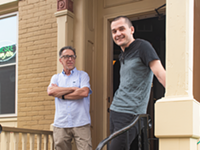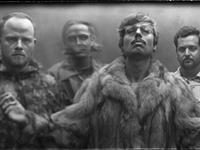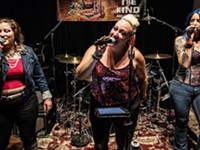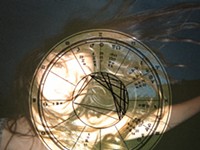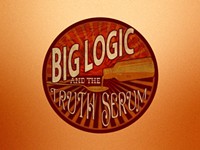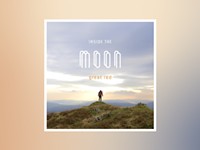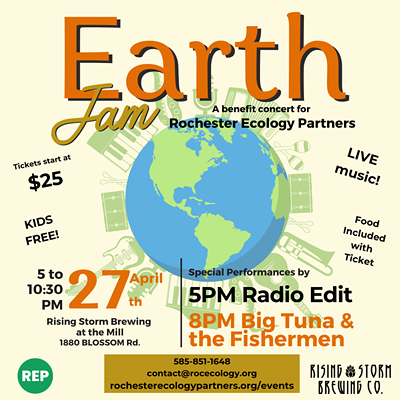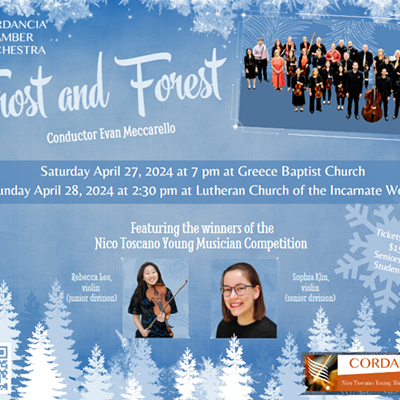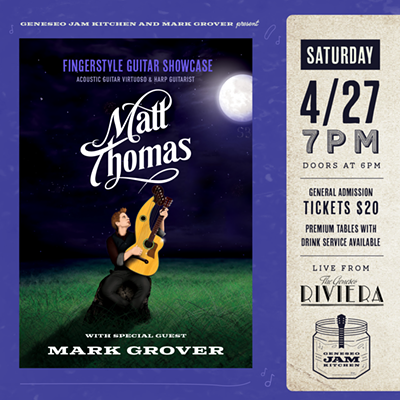[
{
"name": "500x250 Ad",
"insertPoint": "5",
"component": "15667920",
"parentWrapperClass": "",
"requiredCountToDisplay": "1"
}
]
Perhaps you've seen it before ... A pachuco limps the gutter stroll on Cuban heels while a street walker checks her face in a busted compact mirror. A hard guy tries to soft sell, snake eyes roll, and folks from vice to nice rub shoulders on the hot asphalt parade.
Somewhere in the distance, a siren screams, and a pistol pops. It's too late to run; it's too late to duck. Not too long ago, choices still had a chance down here in this tenderloin's tenuous turpitude. Not too long ago, good and evil stared daggers at one another from opposite sides of the room. But now they have surrendered to a slow dance: a sexified shake and shuffle. And the pachuco, the hooker, the hard guy, and all those in their wake — or in their way — have used up all their chips. The siren grows louder, the pistol barks again. And from his spot under a streetlamp, the cat with the flugelhorn kicks into his document. Perhaps you've heard it before ...
No other medium than film noir (OK, maybe roller derby) so gleefully captures end-of-the-line desperation, depravity, darkness, and violence. And whereas the laconic lighting, the obliterated, alliterated, polished palaver and penchant for characters with skewed morals, stands out, it's the dramatic and picturesque soundtrack that positively sends me, dad. It sends Dmitri Matheny, too.
Matheny is an accomplished flugelhorn player who learned at the feet of the undisputed flugelhorn champ, the late Art Farmer. As a bandleader, this San Francisco cat has released 10 albums, his latest being "Sagebrush Rebellion," a nine-song platter on which Matheny celebrates his horn's warm, creamy sound amidst the keen shuffle and shag of his capable band.
But it's Matheny's penchant for the dark side, and moreover, its soundtrack, that currently has him on the road. Matheny and his group are playing jazz noir, taking interpretive stabs at material from cinematic classics like "Touch of Evil," "Laura," "Taxi Driver," "Blue in the Night" as well as the group's own "Crime Scene Suite" — a series of dark vignettes all tied together with a hard-boiled voiceover narrative a la Dashiell Hammett and Raymond Chandler.
We got on the blower and pulled on Matheny's coat about the flugelhorn and noir. It was a righteous blast. An edited version of that interview follows. Dig...
City: Describe the flugelhorn and why you chose it as your instrument.
Dmitri Matheny: The flugelhorn is similar to the trumpet, but has a conical bore and a larger bell, which gives it the distinctive warm, dark tone. The flugelhorn chose me. The first time I played it, I knew I'd found my voice. Trumpet players sometimes double on flugelhorn the way saxophone players double on flute or clarinet. But I was inspired by Art Farmer to dedicate myself entirely to the flugel. Art proved that focused attention can yield extraordinary fluency.
What first influenced you growing up?
I was born in Nashville and grew up in Georgia. The South definitely shaped my musical tastes and temperament. Despite deeply entrenched racial and class tensions, the South is a beautiful, soulful place. People smile at you and look you in the eye. Neighbors know one another. Growing up in the South has given me a deep appreciation of human warmth and kindness, of Southern hospitality. The South also gave me a love of the blues and spirituals, and instilled in me a relaxed pace...the Southern stroll. I imagine you can hear these influences in my music.
Also, my father had a wonderfully eclectic record collection when I was a kid. I owe my love of jazz and symphonic music to Dad's turntable, and credit him with encouraging my aspirations of becoming a professional musician.
What was it like working with Art Farmer?
It was beautiful. Art Farmer was the best thing that ever happened to me. It's hard for me to believe that it's been 15 years since he passed. He's still very much alive in my memory. You know, it's truly a remarkable gift, to meet your hero, the world's acknowledged master on your instrument, and for him to ultimately become your teacher and friend. Miraculously, it happened to me.
Art was my mentor and was one of the wisest and kindest men I've ever met. My years under his tutelage were an invaluable part of my education. He was my finishing school, and I'm profoundly grateful to him for how generous he was with his time, sharing his wisdom about music and life. I've come to believe that mentor/protégé relationships in jazz are vitally important. While it's wonderful that colleges, conservatories and other institutions are now embracing jazz education, I feel strongly that our master musicians need to maintain the lineage of the oral tradition. There are some things you just can't learn in school.
What's something he taught you that you still adhere to?
Art taught me what to value in this craft of jazz: the importance of taking risks and challenging yourself, but never losing the fundamental primacy of playing in tune with a mature tone. He would say, Art insisted that a horn player should try to phrase like a singer: follow the breath, shape each cadence, respect the logic of the line, and if a song has lyrics, learn them. He believed that true improvisation is vulnerable, spontaneous and sincere, not practiced or performative. "Don't perform," he would say, "just pay attention. Listen carefully and respond. Don't reflect. Just listen better. Listen again. Respond again." Art felt that the secret to successful band-leading is to surround yourself with talents greater than your own. Hire the best people, give them what they need, and get the hell out of their way. "If you're the smartest cat in the room," he often said, "you're in the wrong room."
Do you play his horn live?
Every night!
How did you stumble upon this noir project?
The "noir" influence has always been present in my musical world. I love dramatic studio orchestra music, crime jazz, romantic movie themes, classic films of the 40's and 50's, television detective crime dramas of the 60's and 70's, comic books, pulp fiction, melancholy ballads and nocturnes, and stories about loners, lost souls, misfits, star-crossed lovers, heists, cons, capers, seduction, alienation, paranoia, conspiracy, jealousy, loneliness, dreams, rain, night and the city.
Is it the music that brings the darkness to these classic films or the other way around?
Both, don't you think? Sound and image working together to serve the narrative and underscore dark themes of existential depression and isolation.
What would these classics be without the soundtrack?
Just a lot of booze, cigarettes, trench coats, and fedoras, I suppose
When you compose in this style for films that don't exist — or at least don't exist yet — what do you look to as your guide?
I look to the masters: Bernard Herrmann, Raymond Chandler, Franz Waxman, James Ellroy, Elmer Bernstein, Dashiell Hammett, Kenyon Hopkins.
Do you find it difficult to capture the dark mood while playing in bars and small clubs, or is this where it really belongs?
Is there any place darker than the city at night, where wounded misfits wander adrift, and bums bark at you from empty storefronts, like carneys? Where artists and vagabonds gather to shout into the darkness, and con men convene to launch their wicked schemes? I need a drink.



